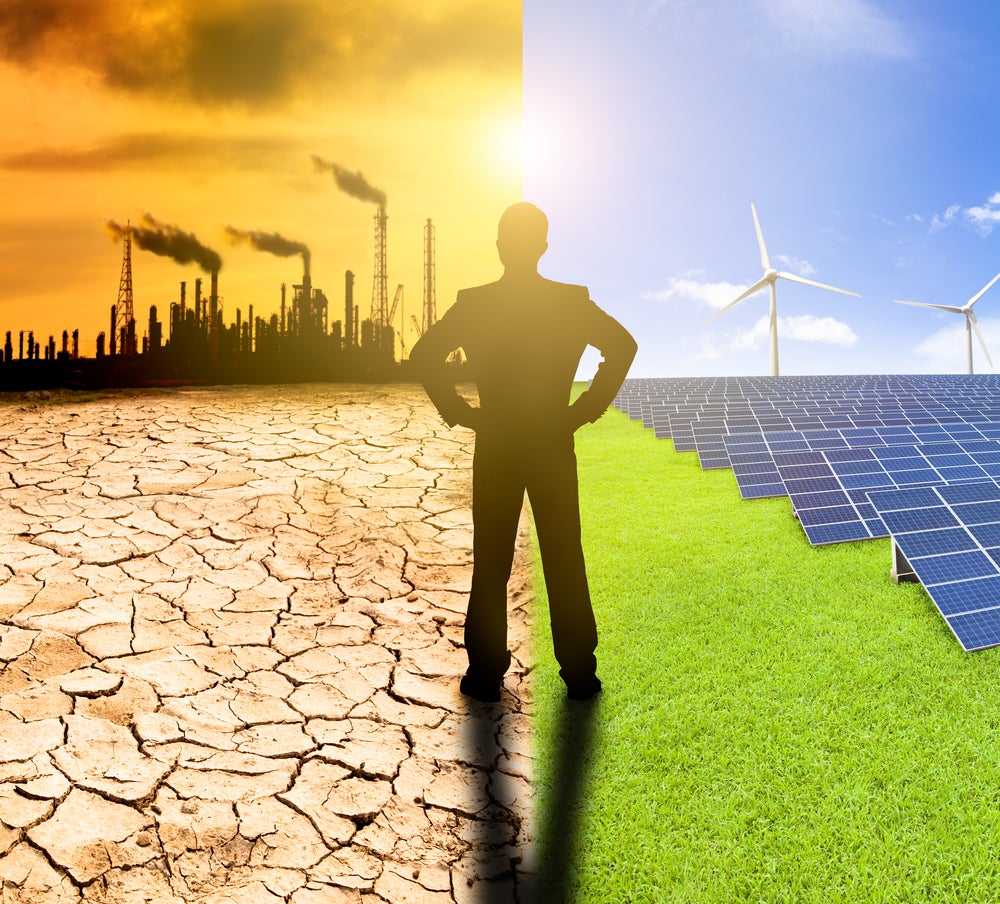
Leadership in equipment financing is essential for meeting the 2050 clean energy transition targets, so who is leading the way in funding the climate-action revolution among bank asset finance providers? Alejandro Gonzalez reports.
Efforts to stave off the worst impacts of climate change come as the world emerges from the Covid-19 pandemic on the one hand, and enters a cost-of-living crisis on the other, accompanied by inflation and high energy prices.
On the whole, there is agreement among governments, industry and banks that achieving the Paris Agreement goals of limiting global warming to well below 2 degrees Celsius, compared to pre-industrial levels, will require greenhouse gas emissions to fall to net zero by mid-century.
Commitments to be climate-neutral by 2050 can be found at the heart of the EU’s European Green Deal and the UK’s The Clean Growth Strategy, but as the deadline approaches, competing priorities are likely to test the mettle of the most committed supporters of the green economy.
Jumping on the clean energy bandwagon
In concert with government pledges, is the industry-led, UN-convened, Net-Zero Banking Alliance (NZBA), which brings together 119 banks in 41 countries with total assets of US$70 trillion, representing 39% of global banking assets.
“The Alliance provides an international framework and guidelines to help banks design their approach to net zero [by 2050] and learn from the institutions that are ahead of the curve,” according to the NZBA website.
How well do you really know your competitors?
Access the most comprehensive Company Profiles on the market, powered by GlobalData. Save hours of research. Gain competitive edge.

Thank you!
Your download email will arrive shortly
Not ready to buy yet? Download a free sample
We are confident about the unique quality of our Company Profiles. However, we want you to make the most beneficial decision for your business, so we offer a free sample that you can download by submitting the below form
By GlobalDataThe Alliance falls under the umbrella group of roughly 500 global financial institutions, the so-called Glasgow Financial Alliance for Net Zero (Gfanz), co-founded by former Bank of England governor Mark Carney.
Both Gfanz and NZBA are accredited by Race to Zero, a UN-backed body that sets criteria to ensure members put forward credible climate change targets and plans.
Profits now
In recent weeks, the FT reported that JPMorgan, Bank of America, and Morgan Stanley (US members of Gfanz) have been getting cold feet over restrictions on fossil fuel investments and financing imposed by the Race to Zero campaign. The banks are considering withdrawing from Gfanz "citing concerns they could be at risk of breaching antitrust laws in the US if they took guidance on investment decisions from the UN campaign."
In September, Bloomberg reported that although Banco Santander SA and other European banks share some of the US banks' reservations, they have no plans to exit Gfanz.
On 4 October, Capital Monitor reported that NZBA member firms had accused Race to Zero of moving the goalposts, this is "introducing increasingly stringent decarbonisation requirements without consulting its signatories. The changes left lenders open to legal challenges and imposed unrealistic expectations on them."
As a result, Race to Zero "will no longer tighten its emissions-reduction criteria on a rolling basis and is holding off on introducing a mechanism by which it could eject non-compliant financial institutions," Capital Monitor reported.
Exclusive: Race to Zero to respond to Gfanz banks’ protests
What is also likely, is that when these lenders trumpeted their Gfanz membership ahead of COP26 last year, they did not foresee their potential loss of earnings from the huge increases in profits by the oil and gas majors this year, and now rue their decision to jump on the NZBA bandwagon too soon.
According to data compiled by Bloomberg, global bank lending to fossil fuel companies is up 15%, to over US$300bn, in the first nine months of 2022, from the same period in 2021. "This is Wall Street just doing its job: making money. Banks earned more than $1 billion in revenue from fossil lending during the first three quarters, in line with 2021. Why quit business with a booming sector over a distant climate goal?," asked Bloomberg in a comment piece.
Profits later
For those funders willing to turn their backs on oil and gas, the road to profit-making will not only look vastly different but hopefully lucrative for those investing in green energy transition.
In its World Energy Outlook 2021, the International Energy Agency (IEA) said that placing the world on a net-zero emissions footing by 2050 will create a US$27 trillion market for manufacturers of wind turbines, solar panels, lithium-ion batteries, electrolysers and fuel cells.
If realised to its potential, the funding of clean energy equipment (and associated project financing) will, over time, replace the global oil market.
So, how committed are bankers to funding the development of renewable technologies and equipment at scale?
The Canadian-based business information publisher Corporate Knights and UK-based financial publication The Banker recently co-published "the world’s first list of green-ish banks ranked by the percentage of revenues they earn through sustainable lending, underwriting and investments."
The 2022 Sustainable Banking Revenues Ranking, produced by the pair, ranks 60 banks for which they found quantifiable sustainable-revenue data.
"Corporate Knights ranked these banks based on their income from sustainable financing activities as a percentage of total revenues, not by total sustainable revenues, to use a more direct comparison and allow smaller institutions to compete head-to-head with global giants," they said in a statement.
In the rankings, the top spot is held by Vancity, a Canada-based credit union, with a sustainable revenue ratio of 34.13%, which is considerably higher than the second-placed bank, Norway’s SpareBank 1 Østlandet, with 23%.
Generally speaking, researchers were disappointed with the overall level of sustainable financing and found that banks had achieved only a fraction of the financing needed for the energy transition.
Corporate Knights estimate that "approximately 5% of total global banking assets will need to be allocated to sustainable finance on a revolving basis. The total outstanding sustainable loan book of the 60 banks in the ranking is US$687 billion, approximately 1% of their total loan (based on their disclosures that can be quantitatively vetted)."
Clean energy transition: UK/Europe bank asset finance
Leasing Life has reviewed the rankings and identified 22 bank asset finance providers active in Europe and the UK.
The top bank asset finance provider is Italy's Intesa Sanpaolo Group, which boasts a sustainable revenue ratio of 6.72%, followed by Germany's Commerzbank (6.53%) and Sweden's Svenska Handelsbanken (2.32%).
Also making the rankings, in order, are: NatWest Group (1.72%), BNP Paribas (1.64%), Swedbank (1.48%), Société Générale (1.39%), Danske Bank (1.26%), Caixabank (1.26%), HSBC (1.16%), Skandinaviska Enskilda Banken (1.11%), Crédit Agricole (0.98%), ING (0.96%), Banco Sabadell (0.64%), Coöperatieve Rabobank (0.58%), Deutsche Bank (0.40%), Virgin Money UK (0.28%), UniCredit (0.27%), Nordea Bank (0.22%), Erste Group Bank (0.21%), BBVA Group (0.09%), Groupe BPCE (0.06%) and Lloyds Banking Group (0.03%).
France and the UK have the highest number of bank asset finance providers, four a piece, in the rankings. France: BNP Paribas, Société Générale, Crédit Agricole and Groupe BPCE. The UK: NatWest Group, HSBC, Virgin Money UK and Lloyds Banking Group.
Ranked by total sustainable revenues, Intesa Sanpaolo (with US$3.68bn) and France’s BNP Paribas (US$1.51bn) appear first and third on the Corporate Knights list.
Criterion
To qualify for the ranking, banks must have signed up for the Net-Zero Banking Alliance (NZBA). Firms on the list must also have committed to reporting climate-related activities through the Task Force on Climate-Related Financial Disclosures framework, designed to boost transparency, Corporate Knights said in a statement.
Despite this, researchers found it "hard to distinguish banks’ revenues from sustainable investments because of the lack of detail and the lofty big-picture nature of the commitments they’ve made."
According to Corporate Knights, these rankings "will likely change quickly as the energy transition ramps up and big institutions compete to participate in new electrical grids, factory retoolings and infrastructure upgrades."
Sustainable Finance Summit 2023 promises to answer today's burning questions







